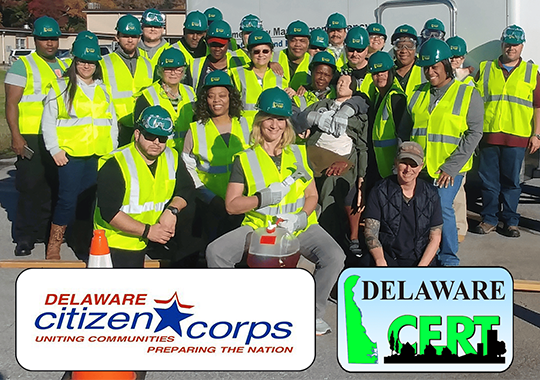The Community Emergency Response Team (CERT) program educates volunteers about disaster preparedness for the hazards that may occur where they live.
CERT trains volunteers in basic disaster response skills, such as:
- Fire safety
- Light search and rescue
- Team organization
- Disaster medical operations
Log In
Search for a local program, register your group and stay connected on the CERT website.
The CERT program offers a consistent, nationwide approach to volunteer training and organization that professional responders can rely on during disaster situations, allowing them to focus on more complex tasks.
CERT in Action
The below video offers a detailed look at the experience on a Community Emergency Response Team. Or check out the 30-second overview for a short clip to share with your community.
CERT Basic Training
The CERT Basic Training includes research-validated guidance for CERT programs to teach members what to do before, during and after the hazards their communities may face.
The materials in the training include:
- Instructor guides
- Participant manuals
- Hazard annex slide decks
Go to CERT’s Webpage to Access All Materials
Independent Study
Whether you’re already in the CERT program or want to learn more before joining, these Emergency Management Institute (EMI) interactive web courses are free and available to anyone.
FEMA Independent Study IS-315: CERT and the ICS – This course introduces CERT leaders to the Incident Command System (ICS), a proven management system used by emergency managers.
Leadership Training
CERT members in leadership positions are encouraged to take the CERT Train-the-Trainer and Program Manager Courses. Visit Emergency Management Institute (EMI) to learn more and sign up.
Drills and Exercises
Drills are excellent opportunities for CERT programs to practice, assess and improve emergency response plans and on-the-ground operations while engaging their volunteers and refreshing the concepts and skills learned in CERT training.
These exercises were developed according to national guidance and principles outlined by the Homeland Security Exercise and Evaluation Program. It is important that CERT programs tailor their exercises to reflect realistic events that may impact their community to practice skills they need to test or practice most.
The CERT Liability Guide is offered for general informational purposes only, and is intended to educate CERT program managers, volunteers, sponsoring agencies, and legal advisors about liability and risk management.
Custom CERT Programs
In addition to the main CERT program, CERT offers programs customized for teens, as well as for workplace and campus-specific situations.
A Teen CERT can support a school’s emergency operations plan and assist emergency services personnel, thus providing valuable surge capacity to local first responders when needed.
A Campus CERT program can support and enhance existing capabilities and CERT volunteers can participate in efforts to increase the preparedness and resilience of the on-campus community.
A Workplace CERT program can support and enhance existing capabilities, and CERT volunteers can participate in efforts to increase the preparedness and resilience of the workplace and community.
History of CERT
The CERT concept was developed and implemented by the Los Angeles City Fire Department in 1985. The Whittier Narrows earthquake in 1987 underscored the area-wide threat of a major disaster in California. Further, it confirmed the need for training civilians to meet their immediate needs.
CERT became a national program in 1993. There are now CERT programs in all 50 states, including many tribal nations and U.S. territories. Each is unique to its community and all are essential to building a Culture of Preparedness in the United States. There are over 2,700 local CERT programs nationwide and more than 600,000 people have trained since CERT became a national program.


